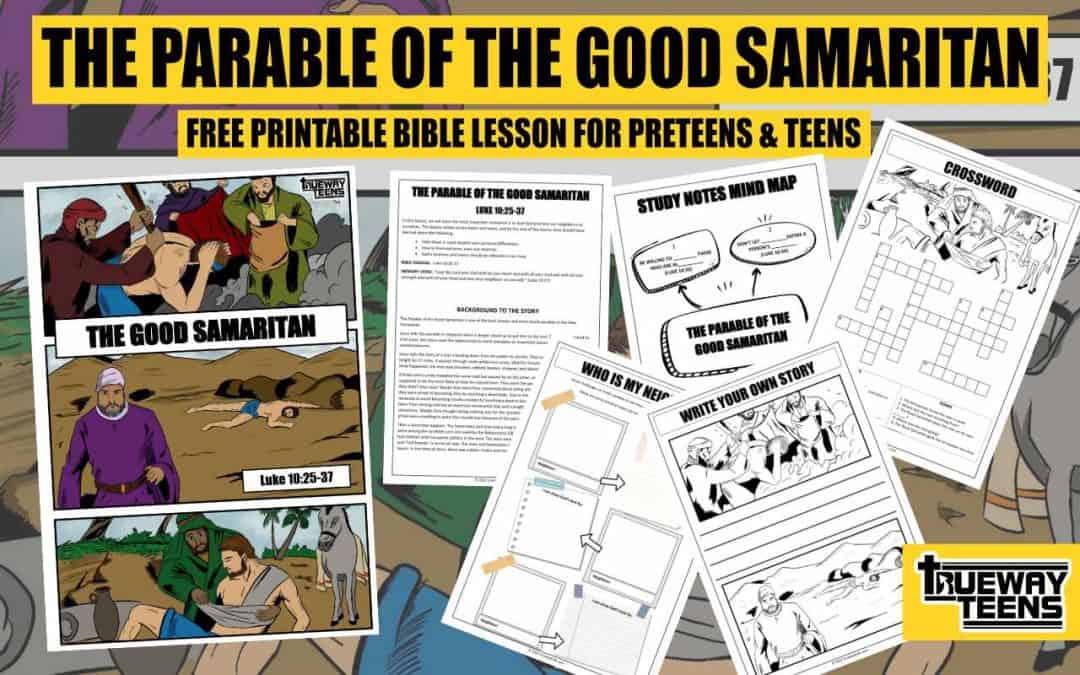In this lesson, we will learn the most important command is to love God and love our neighbours as ourselves. This lesson relates to pre-teens and teens, and by the end of this lesson, they should have learned about the following:
- Help those in need despite your personal differences.
- How to love everyone, even our enemies.
- God’s kindness and mercy should be reflected in our lives.
BIBLE PASSAGE: Luke 10:25-37
MEMORY VERSE:“Love the Lord your God with all your heart and with all your soul and with all your strength and with all your mind and love your neighbour as yourself.” (Luke 10:27)
DOWNLOAD THE FREE PRINTABLE LESSON

Watch the study
BIBLE STUDY NOTES FOR TEENS
The Parable of the Good Samaritan is one of the best-known and most-loved parables in the New Testament.
Jesus tells this parable in response when a lawyer stood up to put Him to the test. The lawyer wanted to trick Jesus, but Jesus used the opportunity to teach everyone an important lesson on the greatest commandments.
Jesus tells the story of a man traveling down from Jerusalem to Jericho. That road dropped 3,300 feet in height for 17 miles. It passed through rocky wilderness areas, ideal for thieves and robbers. And that’s what happened: the man was attacked, robbed, beaten, stripped, and abandoned.
A Priest and a Levite travelled the same road but passed by on the other side of the road. They were supposed to be the most likely to help the injured man. They were the people we would expect to help. Why didn’t they stop? Maybe they were they concerned about being attacked themselves. It could be that they were afraid of becoming dirty by touching a dead body. Due to their temple obligations and the necessity to avoid becoming ritually unclean by touching a dead or bleeding body. It would have prevented them from serving without an extensive ceremonial step and a lengthy time frame to restore their cleanliness. Maybe they thought doing nothing was for the ‘greater good’. Most likely, the Levite and the priest were unwilling to assist the injured man because of the personal sacrifice it would entail.
Then a Samaritan appears. The Samaritans and Jews had a long history of hatred together. The Samaritans were among the Israelites sent into exile by the Babylonians (587-539 BC). Many Samaritans married and had children with Canaanite settlers in the area. The Jews viewed them as “impure” in terms of religion and “half-breeds” in terms of race. The Jews and Samaritans divided themselves by residing in separate towns. In the time of Jesus, there was a bitter rivalry and strong tensions between the two groups.
Yet, The Samaritan’s heart, according to Jesus, is “full of mercy”. He uses what he has with him as first-aid supplies: bandages, wine, and olive oil. He places the man on his donkey, while he walks him to an inn. He stays to care for him overnight, pays for his treatment, and promises to cover any future expenses.
Following the parable, Jesus asked the lawyer and teacher of the law, “Which of these three would you say was a neighbour to the man in need?” The answer was obvious. But the lawyer could not even bring himself to utter the word “Samaritan,” rather he concedes with “the one who showed him mercy.”
This parable challenges our notions of what it means to love our neighbours. In this parable, we learn that becoming a follower of Jesus shows itself in action. Doing and being are connected in a Christian’s walk.
KEY POINTS FROM THE PASSAGE
1. BE WILLING TO HELP THOSE WHO ARE IN NEED (LUKE 10:33)
For whatever reason, when the priest and the Levite saw the man, they decided not to get involved. Maybe they felt sorry for the man. Perhaps if it was a different day, when they had a bit more time they would have helped. But as a former British Prime Minister once said, “No one would remember the Good Samaritan if he’d only had good intentions.” It is not enough to say we care; we need to show it.
The Samaritan did not hesitate to help. He walked over full of compassion, took care of the man, and ensured he was cared for until he was well.
How do we respond when God puts someone in need in our path? Do we walk around it like the priest and Levite, or do we stop to serve like the Samaritan? Do we let our duties, fear, business or the ‘greater good’ prevent us from loving our neighbour as Jesus commanded?
When we show compassion and become involved, we have the chance to genuinely show God’s love to others. If we wait until it is convenient, we will miss out on the opportunity to be used by God to make a difference.
2. DON’T LET RACE DEFINE A PERSON’S WORTH (LUKE 10:34)
Remember that Jews and Samaritans were not simply strangers. Society positioned them at enemies. Prejudice was rampant on both sides. Racial prejudice has long been a major barrier between nations. From ancient times to the present. The Good Samaritan was not stopped by differences. He simply had a desire to help a person in need.
Some have compared it so a 19th century slave showing compassion on their slave master. Like the Samaritan, we must rise above our differences and how our culture and society may expect us to act. We are called to show compassion and demonstrate God’s grace to others. Jesus said we should even “Love your enemies and pray for those who persecute you,” (Matthew 5:44). The Good Samaritan is a great example of this.
3. HELP WITHOUT EXPECTING ANYTHING IN RETURN (LUKE 10:35)
Would you help someone if you knew they would never be able to repay the favour?
The Samaritan knew the injured man might never help him in return. Nonetheless, he did the right thing. Grace means, we do good for others without expecting anything in return. Compassion should drive our actions, not reward. The love and example of Jesus should be what motivates you to show mercy and love to others.
4. LOVE LIKE JESUS (LUKE 10:37)
We can have great intentions to try and love others, but we often fail to carry them out. When we genuinely love God with all our strength, it will lead us to not give up on serving His people. The call is to love as generously as we have been loved, to show the same kindness and mercy that Christ has shown us.
Is God’s love seen in the way we love our neighbours? Our neighbours include more than just those who live nearby, those in our town, our country, and our church congregation. Our neighbours should cross boundaries.
CONCLUSION In conclusion, showing mercy to those in need is the best way to show our love for God and for one another. Let us love as He has loved us. God’s love for us drives us to love others in the same way that God loves them. Don’t be afraid to show mercy and kindness in other people’s life.
YOUTH GAMES AND ACTIVITIES FOR THE PARABLE OF THE GOOD SAMARITAN
BANDAGE THE PATIENT
- Divide players in pairs or teams (depending on group size).
- Within the team, they choose one person to be the injured man.
- The others are good Samaritans.
- Each good Samaritan is given a roll of toilet paper.
- On go they should bandage the injured man.
- The first group to use all their paper (while wrapping well) wins.
SNEAK PAST
- The priest and the Levi walked right past the man in need and didn’t stop to help.
- In this game, one player is chosen to be the injured man. They should lay face down on the ground.
- Other players must walk back and forth.
- At any moment the injured man can look up. Anyone they spot moving is out.
LEARN SOME BASIC FIRST AID
- When the good Samaritan saw the man, he knew how to help.
- This is a perfect opportunity to learn some basic first aid. Ideally have someone from your church or a local organization come and give a basic first aid lesson.
- Alternatively, you can look up some free videos online.
TEN QUESTIONS QUIZ Use the questions on the printable lesson page to have a quiz. Split players into pairs or teams.
Free printable Teen Worksheets in the lesson pack.

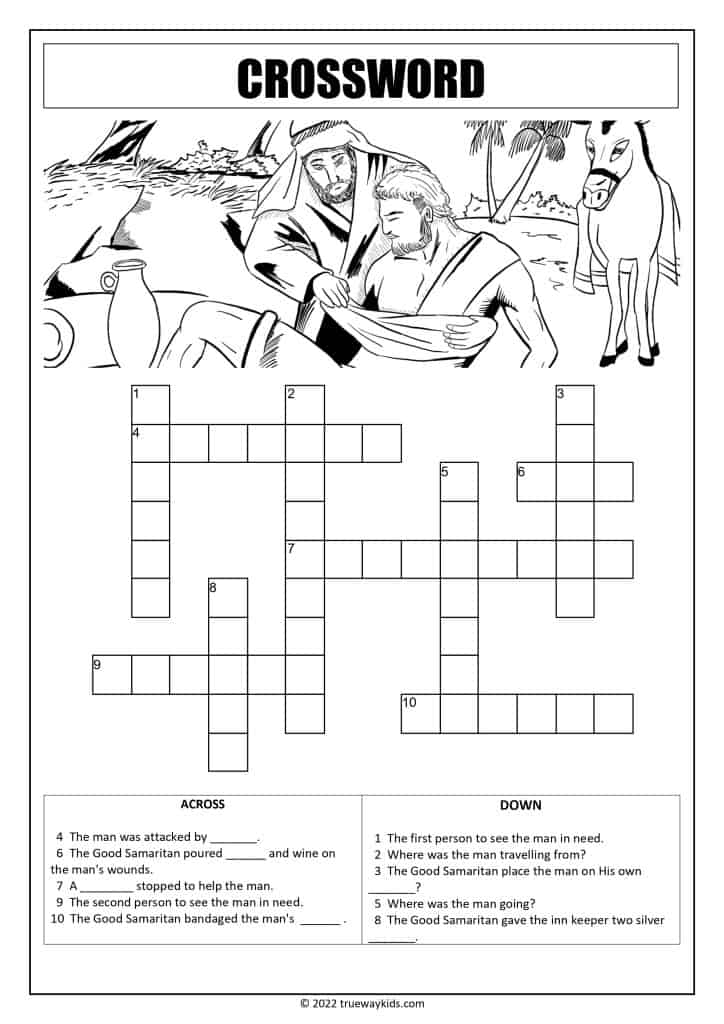

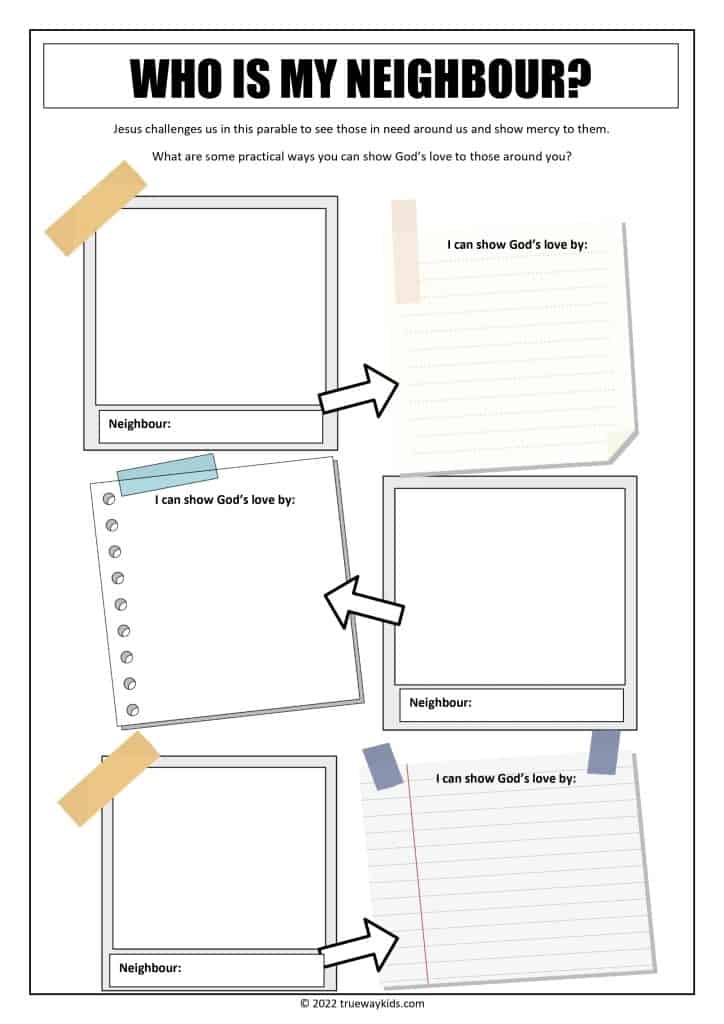
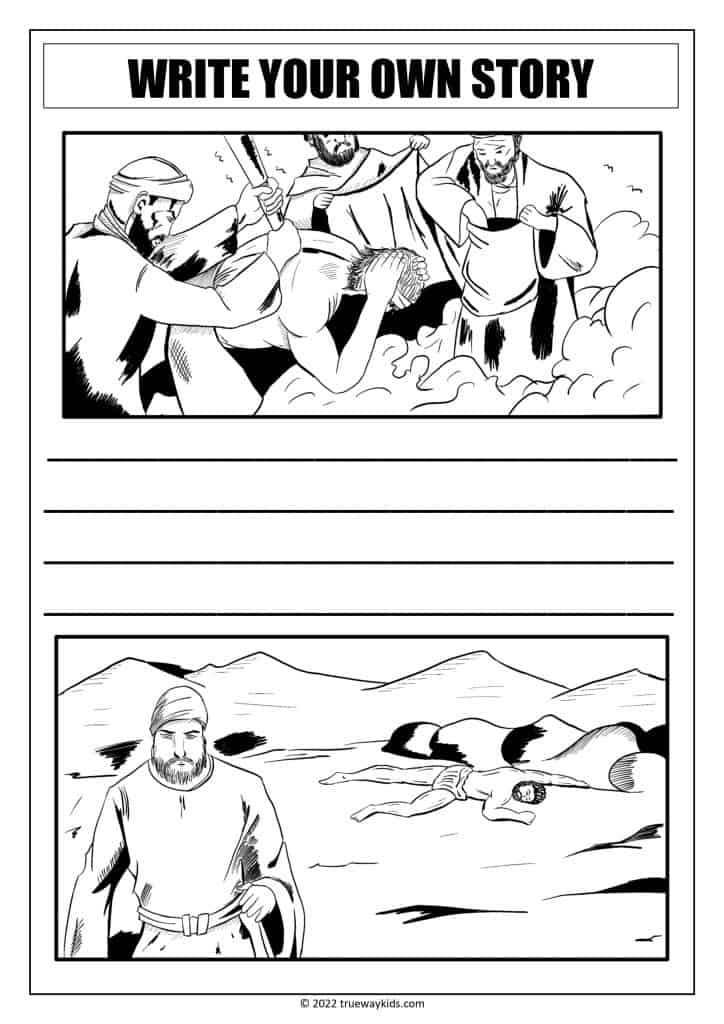
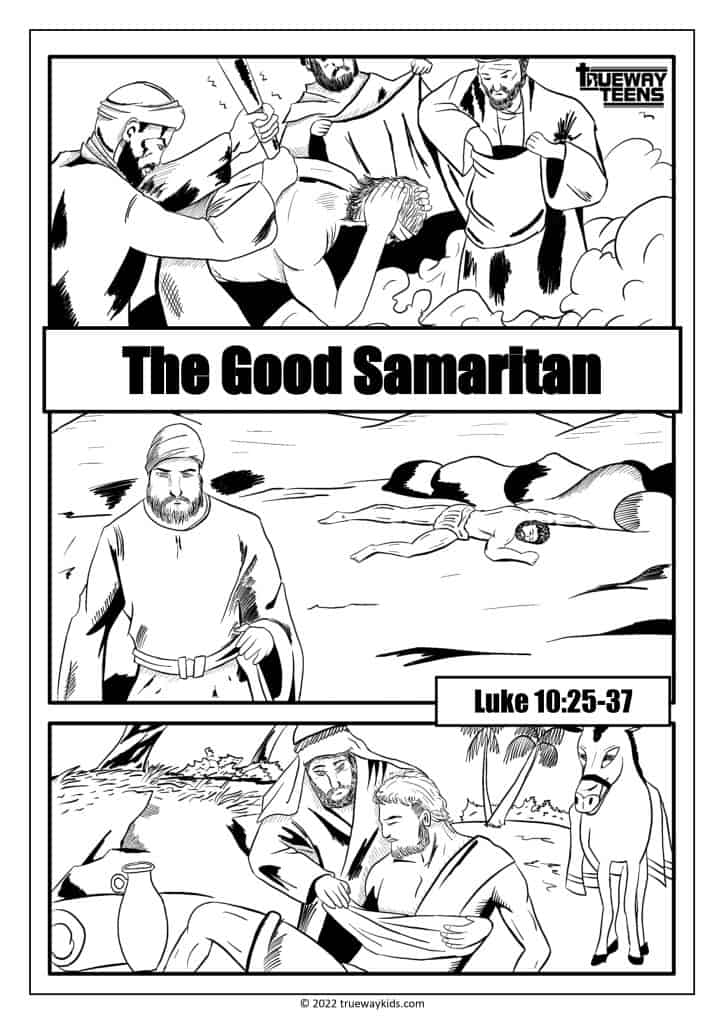


DOWNLOAD THE FREE PRINTABLE LESSON


